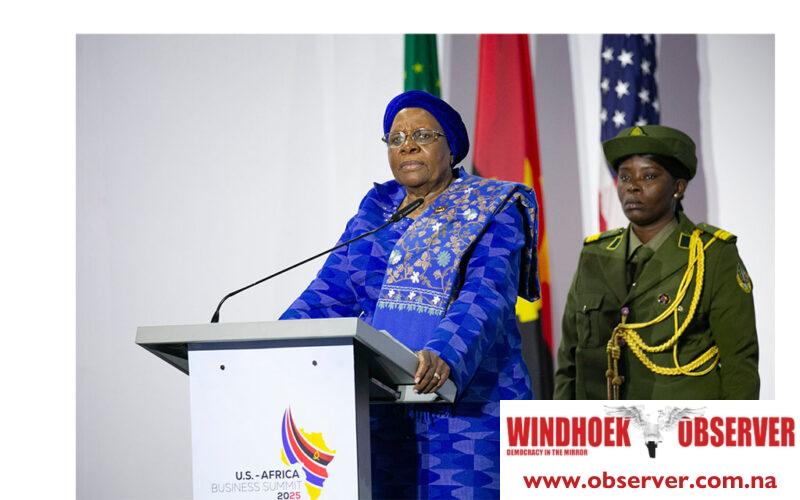Hertta-Maria Amutenja
President Netumbo Nandi-Ndaitwah has stated that limited access to capital and networks continues to hinder the growth of women-owned businesses in Namibia.
This challenge, she said, persists despite ongoing efforts to support female entrepreneurship.
“Nearly 40% of our SMEs are now women-owned, but many still face limited access to capital and networks. Accordingly, we have to bridge this gap,” she said during a panel discussion at the US-Africa Business Summit.
The discussion, titled “Women in Leadership: Driving Innovation, Catalysing Investments and Shaping Policy”, was part of the 2025 summit, marking the 30th anniversary of the Beijing Platform for Action.
Nandi-Ndaitwah acknowledged that while targeted interventions exist through financial institutions, deeper structural reforms are still necessary.
She also called for broader reforms to remove systemic barriers that hinder women’s participation in leadership, innovation, and economic development.
“Women do not need charity; they need opportunity. They do not need permission to lead, they need systems that no longer penalise them for taking leadership positions,” she said.
Nandi-Ndaitwah urged the private sector and global actors to approach women as equal stakeholders.
“Invest in African women not as beneficiaries, but as partners, co-creators, and change-makers. Your voice matters, your vision is needed, and your place is at the helm,” she added.
The government, she noted, has introduced financial instruments to support women-led MSMEs, particularly in sectors like agriculture, tourism, renewable energy, and digital services.
Still, she emphasised that innovation cannot thrive without equal access to decision-making platforms and economic opportunities.
Nandi-Ndaitwah reflected on her role as Africa’s chief negotiator at the 1995 Beijing World Conference on Women, which laid the foundation for the global platform on gender equality.
She said Namibia’s ongoing efforts are rooted in this early advocacy.
On the continental level, she welcomed the African Continental Free Trade Area (AfCFTA) Protocol on Women and Youth in Trade, which provides a framework for addressing structural inequalities in cross-border trade.
Speaking at the summit, Nandi-Ndaitwah said her election as Namibia’s first female president is not an exception but a signal that leadership is accessible to all capable individuals.
“My election was not merely a personal milestone but rather a national affirmation of our collective progress toward gender equality and a signal to women and girls across Namibia and beyond that their dreams are valid, their leadership is needed, and their time is now,” she said.
In her inaugural speech earlier this year, Nandi-Ndaitwah reaffirmed her commitment to gender equality.
She stressed that society must not overlook the contributions of any segment of the population in shaping its political, economic, and social fabric.
She highlighted the 2002 Swapo party congress decision to amend the party’s constitution to implement a 50/50 gender representation policy in all party structures.
Currently, 57% of the cabinet members and 43% of National Assembly members are women.
Namibia is also one of the few countries globally where women hold the positions of president, vice-president, and speaker of the National Assembly simultaneously.
Despite these numbers, Nandi-Ndaitwah emphasised that the focus must remain on merit and capacity.




